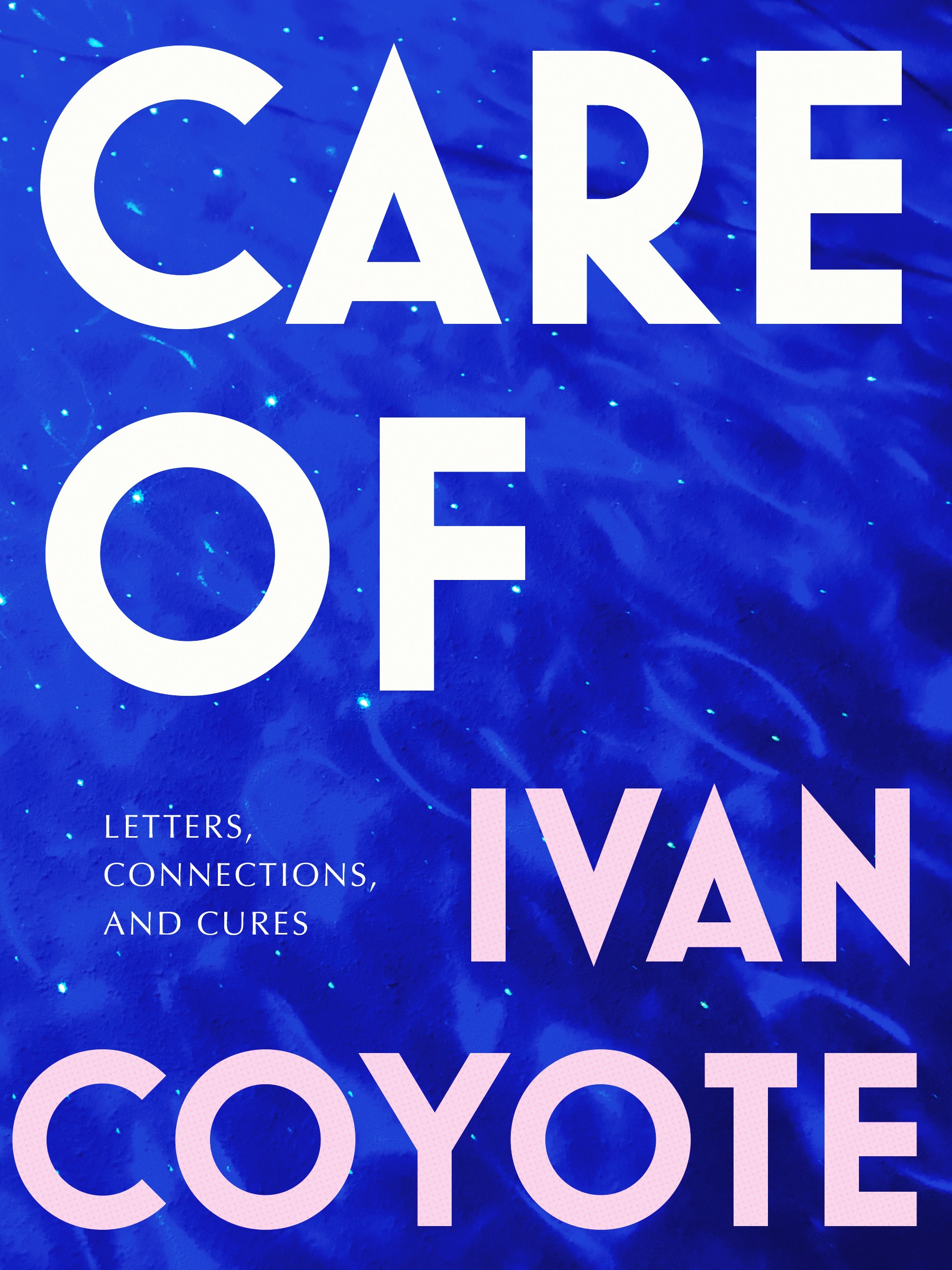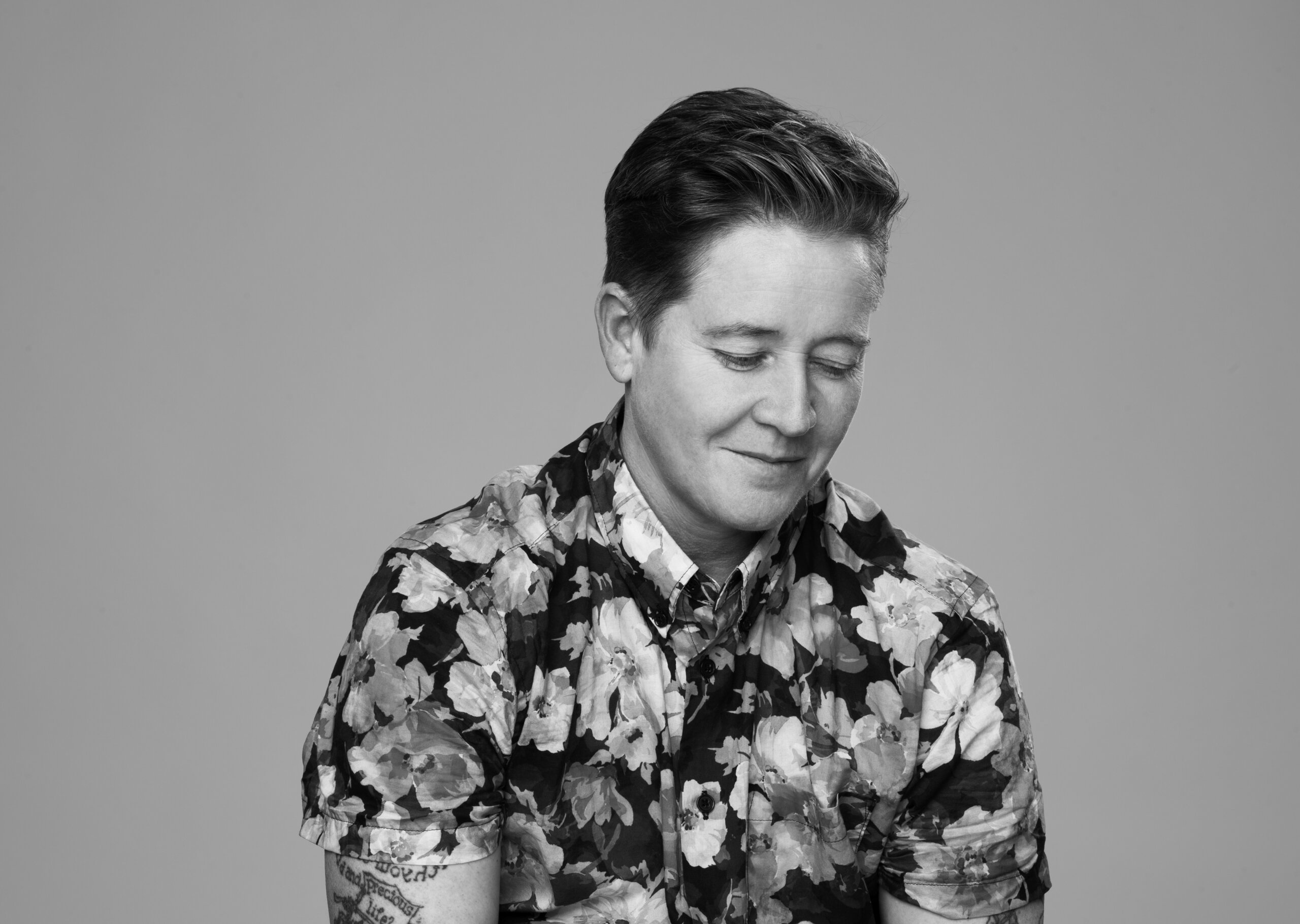Ivan Coyote was a “road dog” for 30 years before the pandemic forced them into stillness. Sequestered in their partner’s apartment in London, Ontario, they tried to work on a novel set both in 1986 and in the present day but struggled to conjure “this unimaginable time.”
“Who could write fiction at a time like this?” they ask in their new book, Care Of: Letters, Connections, and Cures, to which I answered in my head, not me. So they began answering a decade’s worth of mail—letters, emails, handwritten notes obscured by rain—and out of that decision came this bighearted book of correspondence.
A trans man wants to know if he’ll “ever be seen as anything other than a sell out to the gender binary”; a mother tells the story of her 21-year-old daughter who died by suicide; a bookseller describes her younger self as “the little warrior I was shutting away in a very small, very soundproof box.” Written during the first six months of the pandemic, Care Of tenderly navigates everything from top surgery to American philosopher Judith Butler to how to confront the trans-exclusionary beliefs of a longtime friend.

I’ve admired Coyote since the early 2000s, when their first book, the co-authored collection Boys Like Her, was making the rounds on Vancouver’s Commercial Drive, where I lived at the time. Dressed in my roommate Anthony’s clothes, unable to describe how I felt inside, my former self would never believe that twenty years later—when the term “non-binary” feels like an old friend—I would have the chance to interview this longtime hero of Canadian literature, who always finds the perfect words.
Ivan Coyote and I corresponded over email this June and July, me from my home in Eugene, Oregon, them in the wilds of the Yukon, where they are caring for their father and building a cabin.
You tell a story in Care Of about a boy who told you he was gay but couldn’t be. If he was gay, his father would kill him. “I just needed to tell you,” he said. Have you always been a person folks opened up to? Was there a book or performance of yours that first opened up the floodgates?
Ever since I was a kid I’ve loved stories, and people. Long before I was first published, I took a bus with my beloved grandmother Florence and my cousin Dan from East Vancouver into downtown Vancouver. She was in town from the Yukon for a medical appointment, and she decided that Dan (a painter and sculptor) needed a new pair of “slacks” that had no paint or plaster stains on them so he could find himself a proper job. A woman plopped herself in the empty seat next to me and began chatting away, and I responded. We talked for the whole ride from Commercial Drive to The Bay on Granville St. there. My grandmother was not impressed, and told me I never was any good at not talking to strangers. “Place is full of weirdos, and there you are, like a magnet for them,” she tsk-tsked. So I guess the short answer is the former.
Rainer Maria Rilke’s Letters to a Young Poet, Anne Sexton’s A Self-Portrait in Letters, Yiyun Li’s Dear Friend, from My Life I Write to You in Your Life—the epistolary form can reveal as much about the letter-writer as the recipient(s). Was there a particular letter—or your response to it—that first gave you the idea that they could be compiled into a book?
I didn’t imagine it as anything other than finally having time to catch up on my correspondence at first. I recently checked back on my calendar, and during the waning days of March 2020, when we were all grappling with the early lockdown times and scrambling to find toilet paper and masks, I did an online panel discussion on queer memoir. It was an American thing, mostly, with writers like Michelle Tea and Alexander Chee. Samra Habib was on it, and she had recently won Canada Reads, I think. After the panel was done, the host, Cameron Esposito, asked all of us which of our books people should buy and I just said, “Hey, write me a letter? I’ve been answering mail this month and it’s really helping me feel connected to other people, so write me a letter.” A couple of days later I got an email from a publisher asking me if I would consider putting these letters together, if I thought it might work as a manuscript, and it all sort of happened from there. I was already talking to [publisher] Jared Bland at M&S [McClelland & Stewart] about the mystery novel I’m working on, and my agent Rachel Letofsky (who is a total dream) parlayed it into a two-book deal.
Was there a person you once wrote to—a writer, artist or musician, perhaps—when you were, as you say, just a “little seedling” of yourself? Did they write back?
I did once write a letter to author Katherine Dunn after I first read her book Geek Love. This was pre-internet and I did not realize she was deceased.
I am patiently awaiting her response.
Darach, a trans man, is a nurse but isn’t out at work. He writes: “My own identity and stories run a distant second place to the needs and meanings of the patients.” This is one of your longer exchanges and ends with his last letter to you. Can you talk about this choice, which seems to privilege his letter over your response to it?
I just felt that he is such a naturally gifted writer, and both of his letters were so incredibly beautiful that it seemed only right to privilege his voice in our exchange. I get plenty of opportunities to have the last letter in this book. His words deserved it, I feel, as he added so much to the long conversation in such an eloquent way.
A powerful friendship emerges out of your correspondence with singer-songwriter Ferron, in which you talk about Judith Butler’s idea of the value of long conversations (as an antidote to the knee-jerkery of social media). How can we get back to a place of long-form listening?
I think if you read the entire article about Judith referenced in that letter (and you should, Butler is actually a certified genius, I believe), it is apparent that the long conversation Butler is speaking about is vital to larger arenas than just social media scrums. We live in a culture that values the “hot take” over more nuanced, thoughtful and complicated correspondence. I won’t pretend that I don’t like to watch the odd train wreck and ensuing ambulance gazing found daily on Twitter or Instagram, and parts of me really like being able to contact and follow friends and artists and thinkers and theorists in almost real time from the comfort of my own remote trailer in the Yukon bush. What I am also learning to value is the power of deep listening, and the healing that can happen when everyone lays down their pens and ponders peace, or separation, or repair (or not), and how best to lovingly and firmly and compassionately work towards a higher aim than just being right, or being most clever, or getting to the headlines first.
The most complicated relationship in this book is between you and your father. Has he read it? Will he? It is, among other things, such a clear-eyed portrait of you and him. I wonder if this book is a long letter to him in some ways.
My father has dementia and cataracts. He has not read the book, and physically cannot do so on his own now. Perhaps someone might read it to him, but even then, he would not remember much about it for very long. I am hoping that no one reads it to him, because at this point in his dementia he is often scared and confused, and I worry my love for him would not translate to his ears right now as much as my frustration and heartbreak would, and that might hurt him, even if he doesn’t remember why. He does not recall much about the last several years, and his most vivid recollections of his life seem to hover in and around 35 years ago and earlier, which is common with his condition at this stage, from what I am learning about dementia and memory loss.
“Our rights have never been granted to us here in this settler state we now call Canada because of the kindness of the governmental heart.”
This book is very much a letter to him, but one that I hope others will be able to use to do the kind of healing in their family that I am no longer able to wish for for him and me. My job these days is to make sure he is eating okay and getting the care he needs. It’s no longer about him and me working out our complicated relationship, it’s now about the story of my father and me, and how I hope he remembers me right now, until he cannot anymore.
In the United States, where I’ve lived since 2007, transphobia seems to have caught like wildfire from the United Kingdom (not that it wasn’t always here and there, but, well, we’ve had more than 100 anti-trans bills in more than 35 states so far this year). I wonder if you could talk about what it feels like on the ground in Canada. I’m reminded of a great line of yours from Rebent Sinner: “I can’t even move to Canada because I already live in Canada.”
I think trans and non-binary people need to remain vigilant in all states, in all countries and with regards to all political parties. Our rights have never been granted to us here in this settler state we now call Canada because of the kindness of the governmental heart: we have always had to fight for our basic rights and dignity and health care, and we must always keep in mind that with the wrong election or a cold wind, or bad candidate, those rights could be rolled back.
I do know that my job as a trans writer—especially one who works in our education system and meets trans and non-binary youth in the hundreds on the daily when I’m touring schools (pre-pandemic, of course)—got infinitely harder the moment The Cheeto [Donald Trump] was elected in the U.S. in 2016, and that has not changed much yet under Biden. The Cheeto unleashed a transphobic beast that [former U.S. president Barack] Obama had barely kept at bay. It has always had a strong presence in the U.S., but scratch the old red and white, maple-scented paint in Canada, and you will reveal those sentiments on this side of the border as well. I meet those kids struggling in school. I get letters from their terrified parents and their well-meaning but untrained and ill-prepared counsellors. The climate is hostile, and it affects trans people all over the world. Borders do not stall it or stop it.
“Writing this book changed me. It’s too early to label or put into words, but I feel like a different person.”
To think that transphobia is any less a part of the fabric of this country is to let your guard down, and we cannot ever afford to do that. That is dangerous and will cost us more lives, I feel.
Ace, a “binary transgender guy,” writes to you about the generational divide in the trans community, and the assumption from younger trans folk that he’s a misogynist. You write, “I think these kids… need to take what we fought for and won for granted, so they can make room to expect so much more than we dared to ever hope about.” I wonder what about the younger generation gives you hope lately?
I am enjoying my students very much these days. They seem a lot smarter than I ever recall being at 19 or 20 years old. I’m looking very much forward to September when I meet the latest comrades in the struggle to make art and inspire each other.
Care Of is your 13th book. How have you changed as a writer between your first book, Boys Like Her (1998), and this one?
I think I hit my stride on this 13th book. Writing this book changed me. It’s too early to label or put into words, but I feel like a different person, not just a different writer.
Have you started working on the novel again?
Yes, I’m really into the build-a-cabin-and-think-about-the-structure-of-the-story phase of writing this next book, and it’s all clicking together in my head. Once I get the roof on and the wood stove in, I think the words on the page bit is going to get cooking along very well. I think I will have the rough draft together by Christmas, or at some time in those short, short days of winter. I like to write for long periods of time when it’s dark most of the time. In the summer, it’s time for swimming and for building things, and for thinking about what the story means to you.
A letter from Tem, a teacher (“Handwriting slanted to the left, which reminded me a little of my sister, who is left-handed”), ends, “How are you?” It is June 10, 2020, when you respond. It is June 10, 2021, today, as I write this to you. And, so, I’ll ask as my final question, as we endure yet another pandemic summer, how are you now?
I’ve never felt better. I have made the final choice to move back to the Yukon, and to use what I have learned in the last couple of years to contribute to the arts community here in my hometown and territory. It’s time for me to slow down and spend less time on the road and more time picking cranberries and watching the fire in the new woodstove. Play my saxophone. Take a class at night school. Go fishing. Write long letters to everyone I love, and then some. I’m turning 52 next week, and I feel really good about it. I’ve been working hard physically and I feel strong, and my back doesn’t hurt as much as it did when I was sitting on a plane or a train or a cab every other day. I wake up every day grateful.
This interview has been edited for length and clarity.


 Why you can trust Xtra
Why you can trust Xtra


